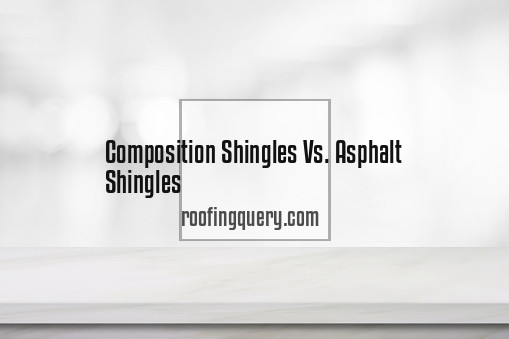Introduction:
There are two types of shingles that are commonly used on roofs: composition shingles and asphalt shingles. Both types of shingles have their own advantages and disadvantages, so it is important to weigh these factors when deciding which type of shingle is right for your home.
Composition shingles are made of a base layer of fiberglass or paper, with a top layer of asphalt. They are available in a variety of colors and styles, and are generally more expensive than asphalt shingles. Composition shingles are also more durable than asphalt shingles, and can last up to 50 years with proper maintenance.
Asphalt shingles are made of a base layer of fiberglass or paper, with a top layer of asphalt and mineral granules. They are less expensive than composition shingles, but also have a shorter lifespan of 20-30 years. Asphalt shingles are available in a variety of colors, but are not as durable as composition shingles and are more susceptible to wind damage.
Differences Between: Composition Shingles vs. Asphalt Shingles
1. Composition shingles are made of a fiberglass mat, while asphalt shingles are made of an asphalt-coated paper.
2. Composition shingles have a longer lifespan than asphalt shingles.
3. Composition shingles are more resistant to fire than asphalt shingles.
4. Composition shingles are more resistant to wind than asphalt shingles.
5. Composition shingles are available in a variety of colors, while asphalt shingles are typically black or dark gray.
6. Composition shingles are more expensive than asphalt shingles.
7. Composition shingles are installed using staples or nails, while asphalt shingles are installed using asphalt cement.
8. Composition shingles are typically removed by a professional, while asphalt shingles can be removed by the homeowner.
9. Composition shingles must be disposed of in a landfill, while asphalt shingles can be recycled.
In-depth Review of composition shingles
Composition Shingles:
1. They are more durable than asphalt shingles.
2. They are less likely to crack or break.
3. They provide better insulation.
4. They are available in a variety of colors.
5. They are easy to install.
6. They are low maintenance.
7. They are fire resistant.
8. They are wind resistant.
9. They last longer than asphalt shingles.
10. They are recyclable.
Asphalt Shingles:
1. They are less durable than composition shingles.
2. They are more likely to crack or break.
3. They provide less insulation.
4. They are available in fewer colors.
5. They are more difficult to install.
6. They are high maintenance.
7. They are not fire resistant.
8. They are not wind resistant.
9. They do not last as long as composition shingles.
10. They are not recyclable.
. asphalt shingles – Its Pros and Cons
Composition Shingles vs. Asphalt Shingles
1. Composition shingles are made of a fiberglass mat that is coated with asphalt and then covered with ceramic granules. Asphalt shingles are made of a heavy paper that is saturated with asphalt and then covered with mineral granules.
2. Composition shingles are more durable than asphalt shingles. They can withstand high winds and are resistant to fire. Asphalt shingles are not as durable and can be damaged by high winds and are not as fire resistant.
3. Composition shingles are more expensive than asphalt shingles.
4. Composition shingles are available in a variety of colors and styles. Asphalt shingles are available in a limited number of colors and styles.
5. Composition shingles are easy to install. Asphalt shingles are more difficult to install.
6. Composition shingles require less maintenance than asphalt shingles. Asphalt shingles require more maintenance.
7. Composition shingles last longer than asphalt shingles. Asphalt shingles have a shorter lifespan.
8. Composition shingles are environmentally friendly. Asphalt shingles are not environmentally friendly.
9. Composition shingles are recyclable. Asphalt shingles are not recyclable.
Hopefully, you are clear on the difference between composition shingles and asphalt shingles. If you still have any questions, feel free to leave a comment below.

